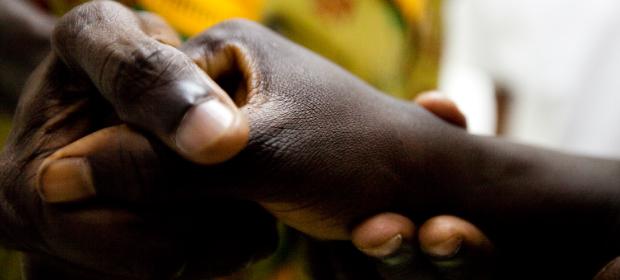Where We Work
See our interactive map


Spéciose Mukaferesi is a nurse in Rwanda, and for nearly 20 years, she has lived with HIV. For much of that time, she has also lived with the stigma that can accompany a positive diagnosis. In 2007, she reached out to other women like herself to start Rushaki Health Center’s first support group for HIV-positive widows.
“Starting a support group changed my life,” Spéciose says. “I’m a widow, so all of us widows got together to talk about our lives, our problems. It helped reduce the burden that we have.”
Five years later, Spéciose still meets with her support group, and she supervises six other groups at the health center as well, reaching over 200 members. She talks to the members about the HIV/AIDS services offered at the clinic, the importance of consistent antiretroviral therapy (ART), and how to respond to the challenges of living with HIV.
It hasn’t always been easy.
“When we started offering ART services in 2006 there was a lot of stigma, so we had to go into the villages to find people who tested positive and encourage them to come to the health center to get treated,” Spéciose says.
Today, the groups attract people like Titien and his wife, who come to the center even though it’s a two-hour journey across miles of tea plantation and rutted dirt roads through Rwanda’s hilly terrain.
“When I first discovered I was HIV-positive I wasn’t comfortable talking about it, even with community health workers. But since joining a support group, I’ve started to open up and share my experiences,” Titien says, adding that the group is helping him and his wife communicate better, live positively with HIV, and plan for the future.
Spéciose focuses part of her counseling on the importance of proper nutrition and how it is essential to maximizing the full benefits of ART. Moving beyond education, Spéciose and her colleagues also helped all support group members set up vegetable gardens at home to ensure a well-balanced diet and helped each family purchase a goat or a motorcycle. The goat, which Titien and his wife chose, provides manure for the garden, while others use a motorcycle to travel to the market to sell their vegetables. All members of the support groups, which double as small business cooperatives, also contribute a monthly fee to the group.
“We contribute Rwf 200 to the group every month because we’re thinking of our future,” Titien says.
Titien’s group opened a canteen last year at the health center. The canteen sells cookies, soda, and soap. Titien and his group plan on purchasing cows with the canteen’s profits for each couple in the group to produce milk to consume and sell.
So far, Spéciose’s bee farming cooperative is the only one that can operate without the health center’s support, but she says the other groups—which focus on horticulture, handicrafts, and rabbit rearing—are like small children: at first they need lots of care and attention, but as they grow and mature they become independent. The center aims for all of the support groups to be self-sufficient this year.
Beyond helping people living with HIV to help each other, the support groups are also making it possible to discuss HIV in the wider community, encourage more people to get tested, and prevent discrimination against those living with HIV.
“Before the support groups started at Rushaki, people living with HIV were discriminated against by those living without HIV,” Titien says. “But after joining support groups we started participating more in community activities like umuganda [community work], where we talk about HIV and the importance of getting tested.”
Earlier this year, members from the seven support groups organized a mass of thanksgiving and social gathering for their families, friends, and community members, including politicians, local authorities, and religious leaders.
At the mass, support group members offered a gift of thanks—fruit, vegetables, or baskets—to publicly acknowledge the positive impact of the support groups and ART on their lives. At the event, Titien and other support group members talked about HIV and encouraged family, friends, and community leaders to get tested. By the end of the day, more than 100 additional people knew their status thanks to a mobile testing center Spéciose and her colleagues set up at the church.
“We’re going to have a mass of thanksgiving and social gathering every year because it helps us fight against stigma and encourage others to get tested,” Titien says.
This work is supported by the IntraHealth-led HIV/AIDS Clinical Services Program in Rwanda, which is funded by USAID.



